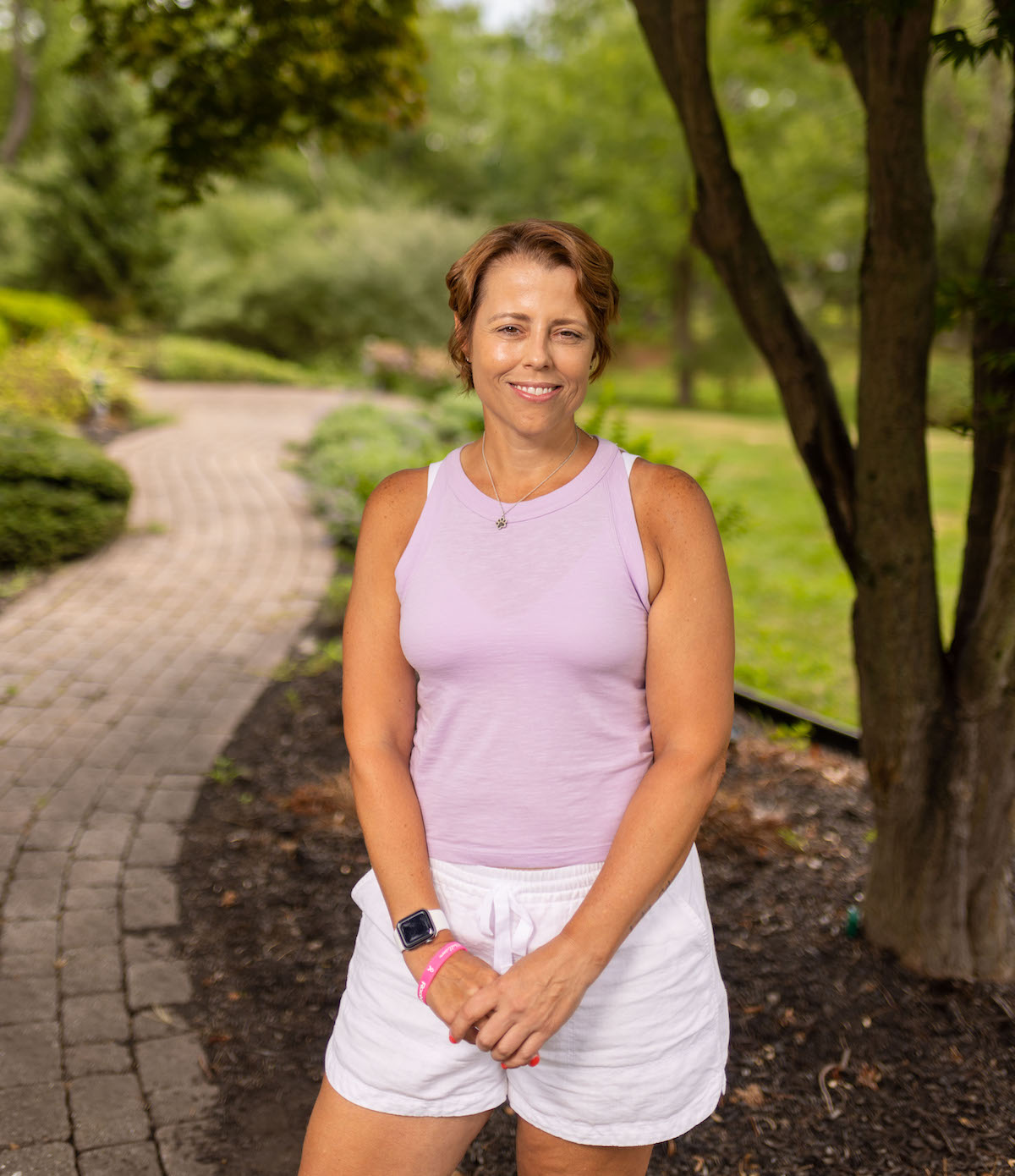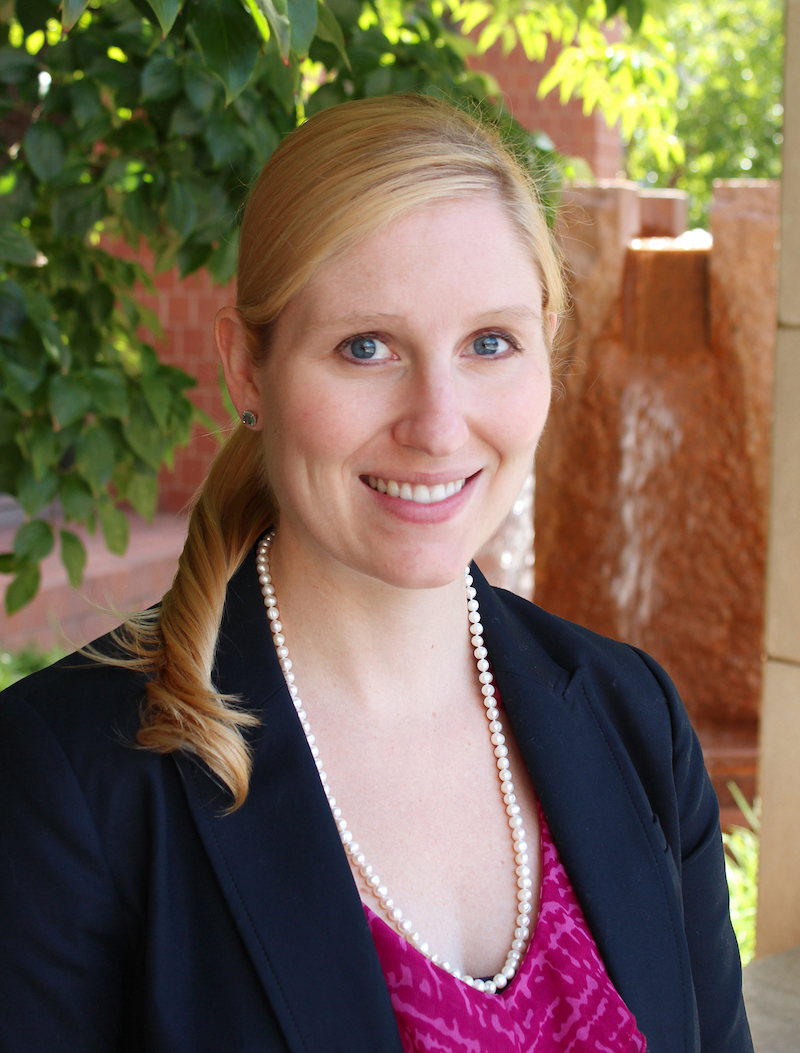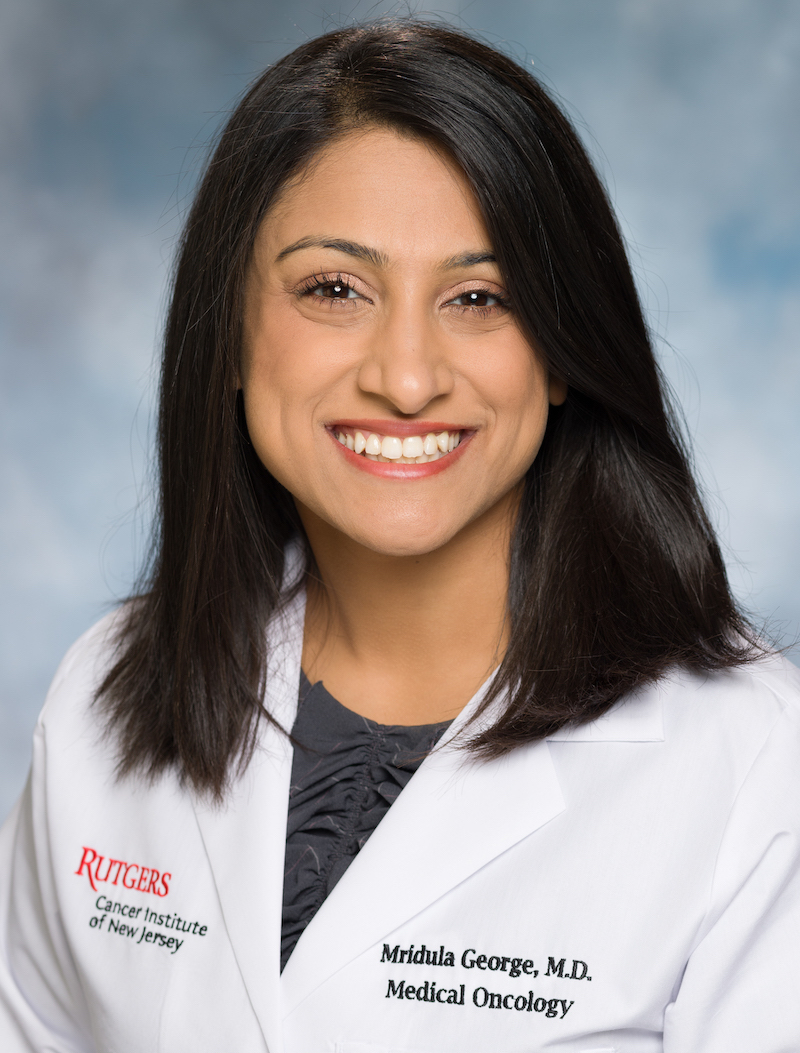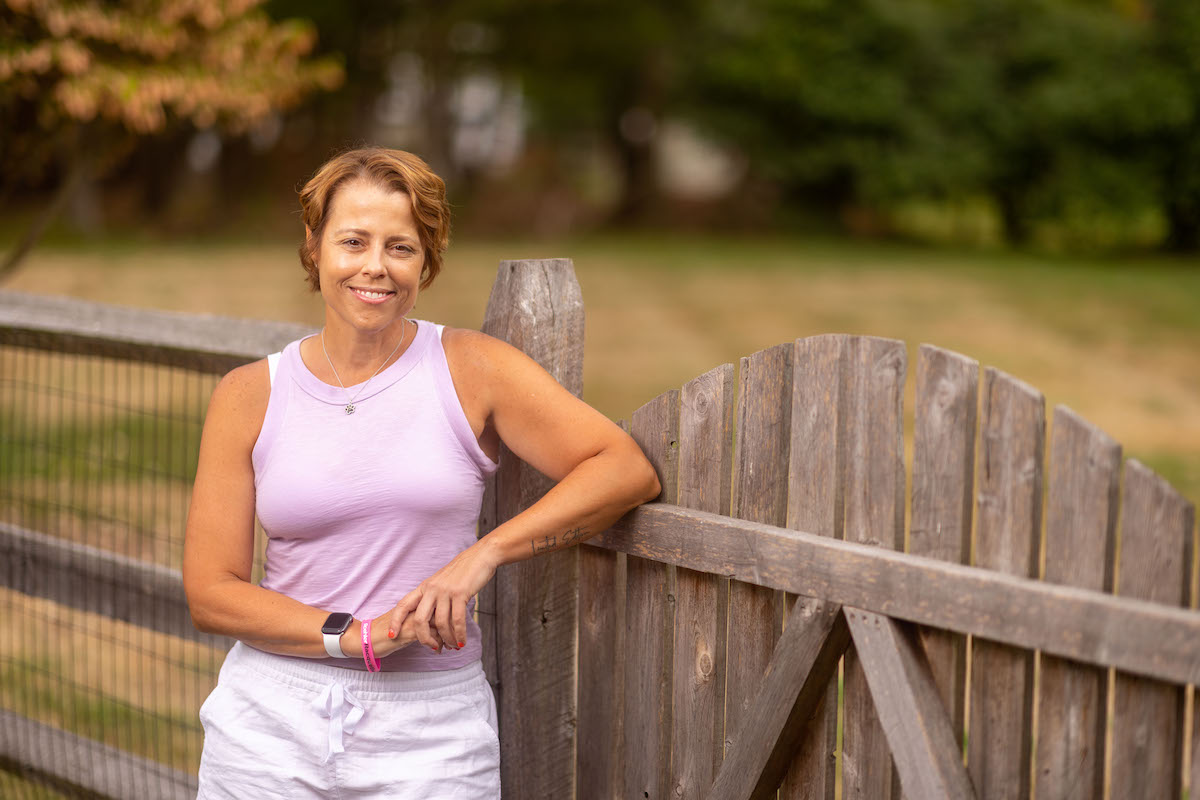
Story by Mary Ann Littell • Subject Portraits by John O'Boyle Subscribe to Cancer Connection
The game of racquetball is not for the faint of heart. It requires a certain degree of toughness. Fast and furious, the hard rubber ball ricochets around the court at more than 100 mph during many shots.
“Racquetball is a huge part of my life,” says Aimee Roehler. “I’ve played injured, I’ve played when I was tired, and I’ve been hit with the ball more times than I would like to count. Nothing keeps me from playing—not even breast cancer.”
That conviction was put to the test this past year, when Roehler, age 47, was diagnosed with breast cancer. For the highest level of care, Roehler relied on her team of experts at Rutgers Cancer Institute of New Jersey and Robert Wood Johnson University Hospital Somerset. Whenever she faced a surprise - like finding out she needed a mastectomy rather than a lumpectomy - they tailored a treatment plan to combat the cancer while keeping her on the racquetball court.
Roehler’s level of fitness is enviable at any age, let alone 47. She was introduced to racquetball at age 13, when her mother, then a night student at a community college, took a racquetball class to meet a physical education requirement. “I’d tag along, hang out at the gym and do my homework,” says Roehler. “Then I began to play, and I loved it. I got hooked.”
Through years of serious competition, Roehler rose to the sport’s most elite level. She is a member of the USA National Racquetball team, a twelve-time national doubles champion, and a three-time world doubles champion. She was inducted in the USA Racquetball Hall of Fame in May 2022. The ‘mom’ of a pit-bull/terrier rescue dog named Maggie, she has her own social media marketing firm, helping local businesses, sports organizations, and small companies grow by managing their Facebook, Instagram, and other accounts. Divorced a year a half ago, she has a boyfriend, Ruben Pagan, whom she met - where else? Playing racquetball.

Aimee Roehler, pictured above.
In early 2021 Roehler had a routine mammogram at Steeplechase Cancer Center at Robert Wood Johnson University Hospital Somerset, an RWJBarnabas Health facility. Collaborating with Rutgers Cancer Institute, Steeplechase Cancer Center offers the most advanced approaches to cancer treatment, including clinical trials.
When she was called back for a second mammogram and an ultrasound, she wasn’t alarmed. “I have dense breast tissue, so that’s happened before,” she notes. But when she was told she needed a biopsy, “I started to get a little worried.”
The hospital gave Roehler a list of cancer experts and advised her to see one right away. Researching them online, she selected Lindsay Potdevin, MD, a surgical oncologist in the Stacy Goldstein Breast Cancer Center at Rutgers Cancer Institute and at Steeplechase Cancer Center
“Reading her physician profile, I saw that she’s really well-trained and smart,” says Roehler. “Instinctively I felt she’d be right for me. We met just before I had the biopsy. She said there was a good chance I had breast cancer. That just floored me. I’d had no signs, no lumps, no pain, nothing.”
“I was concerned because her mammogram and ultrasound images showed highly suspicious masses,” explains Dr. Potdevin. “Most often, biopsies determine that these types of masses are breast cancer.”
Potdevin’s instincts proved correct. The biopsy showed invasive lobular carcinoma (ILC), a cancer that begins in the milk-producing glands (lobules) of the breast. Fortunately, it was found early, due to Roehler’s diligence in having annual mammograms. “Regular mammography helps with early detection,” says Potdevin, who is also an assistant professor of surgery at Rutgers Robert Wood Johnson Medical School (RWJMS). “When detected early, breast cancer is very treatable, with an excellent prognosis.”
Potdevin devised a treatment plan: lumpectomy, possibly followed by chemotherapy, depending on the results of the surgery. “I asked her, ‘How soon can we do this?’” says Roehler. “I had the nationals (racquetball championship tournament) in June, and of course I wanted to play. She agreed to get me on the schedule right away.”
Roehler’s next two weeks were a blur of appointments, tests, and scans. Unfortunately, an MRI identified a separate area of concern that had not been detected in the mammogram or ultrasound.
“Additional biopsies found ductal carcinoma in situ, a very early type of breast cancer,” says Potdevin. “Because Aimee now had multiple areas of cancer, optimal surgical therapy was a mastectomy. The good news was that the cancer did not appear to involve her skin or nipple, so we could preserve those areas. This is a nice option for patients, allowing them to maintain more of their natural appearance even after the surgery.”
Roehler was concerned about how quickly she would recover from surgery. And she’s left-handed too. Racquetball is a hard-hitting sport. How would this left-side mastectomy affect her arm strength and ability to hit the ball? Potdevin said recovery time would be a minimum of three to four weeks. She assured Roehler that she’d do everything she could to preserve her mobility.
“At that point, we moved quickly to get her ready for surgery,” says Potdevin. “To minimize recovery time, we discussed holding off on reconstruction, and just focusing on the mastectomy as the initial surgery. This would allow for faster recovery and return to activities, including her upcoming tournament. She could consider reconstructive surgery at a later time, if she wished.”


Aimee Rohler was given a list of cancer experts to consider, and advised her to see one right away. After researching them online, she selected Lindsay Potdevin, MD (above, left), a surgical oncologist in the Stacy Goldstein Breast Cancer Center at Rutgers Cancer Institute and at Steeplechase Cancer Center. “Reading her physician profile, I saw that she’s really well-trained and smart,” says Roehler. “Instinctively I felt she’d be right for me.
Mridula George, MD (above, right), a medical oncologist who sees patients at both Rutgers Cancer Institute and Robert Wood Johnson University Hospital Somerset, administered the oncotype DX breast recurrence score test that determined that Aimee Rohler had treatment benefit from chemotherapy as part of her treatment protocol.
The mastectomy was performed at Robert Wood Johnson University Hospital Somerset. The surgery went smoothly and Roehler went home that same day. “We removed a few lymph nodes in her underarm, as is standard for breast cancer surgery,” explains Potdevin, “but knowing she is left-handed, I made sure that the trauma to that area was minimized. Post-surgery, we would watch her carefully for any effect on her arm function.”
For Roehler, the worst was behind her. But the day after her surgery, her boyfriend received his own bad news: a diagnosis of prostate cancer. “What more could be thrown at us?” asks Roehler. “But we’re a strong team. We figured, if we can get through this, we could get through everything.”
With the nationals postponed due to the COVID-19 pandemic, Roehler turned her focus to her next steps in treatment. One of her lymph nodes tested positive for cancer. A test called the oncotype DX breast recurrence score is done to determine treatment benefit from chemotherapy. The results of Roehler’s oncotype test indicated that she’d benefit from chemotherapy. This would be administered at Steeplechase by Mridula George, MD, a medical oncologist who sees patients at both Rutgers Cancer Institute and Robert Wood Johnson University Hospital Somerset. Given the oncotype score, Dr. George recommended chemotherapy in addition to hormonal therapy.
She began chemotherapy in mid-June. “Chemotherapy has many side effects, including fatigue,” says Dr. George, who is also an assistant professor of medicine at RWJMS. “We added supportive medications to manage some of the side effects. I was happy that Aimee was able to play two to three hours of racquetball daily while going through chemotherapy.”
Roehler used the Paxman cold cap to help with chemotherapy-induced hair loss. Such scalp cooling systems are worn during chemotherapy to prevent loss of hair. However, she had hair thinning in spite of using the cold cap. “Losing my breast didn’t really bother me. I wear my breast prosthesis and no one’s the wiser,” says Roehler. “But losing my hair was devastating. I know, it sounds dramatic. But I cried my eyes out.”
Once chemotherapy was completed, she had radiation therapy, administered by Joel Braver, MD, medical director of radiation oncology at Steeplechase Cancer Center. “All my treatment was close to my home in Whitehouse Station,” she says. “Very convenient and patient-friendly.”
Roehler was happy to have met her goal of finishing both treatments by the end of 2021. Her hair is growing back and she feels great, and so does Pagan, who has worked his way through his own cancer treatment. “We supported each other and took care of each other. Everything turned out well,” Roehler says with satisfaction. She will be on maintenance therapy for five years: a daily oral pill and monthly injection. At some point, she plans to have breast reconstructive surgery, “when the time is right.”
Thinking about what she’d been through, Roehler wanted to share her experiences with others, particularly those in the racquetball community. She also hoped to raise awareness about the importance of regular mammography. She wrote a story, titled “A Life-Saving Message,” about her cancer journey, and it was posted on the Team USA website. Her message was clear: “Ladies, get your boobies checked!”
She also wanted to find a way to give back to Steeplechase Cancer Center. “The hospital’s Patient Assistance Fund provides financial aid for patients, for wigs, breast prostheses, medications, transportation, the scalp cooling systems worn during chemotherapy to prevent hair loss, and more,” she says. “Ruben came up with a great idea for a fundraiser. He’s a designer—so he designed very cool breast cancer awareness T-shirts and we sold them online. The entire proceeds, about $6,500, were donated to the fund.”
She adds: “It’s the least I can do for Steeplechase. It’s my way of saying thank you for the phenomenal care I received.”

Selecting a National Cancer Institute-designated Comprehensive Cancer Center was instrumental in her recovery, says Potdevin. She ticks off on her fingers: “We have the benefit of providing optimal care to our patients based on the latest research. Our specialists are all under one roof, which promotes a collaborative environment and streamlines care. Our multidisciplinary team meets at least weekly to discuss cases like Aimee’s, to ensure all ideas are heard and everyone is on the same page with the optimal plan of care for each individual.”
She adds: “We have our standard approaches for treating breast cancer, but for each patient we factor in their goals, priorities, and quality of life. For Aimee, her athletic endeavors are incredibly important, and we are glad to see her successfully through her cancer treatments and on to winning more tournaments!”

